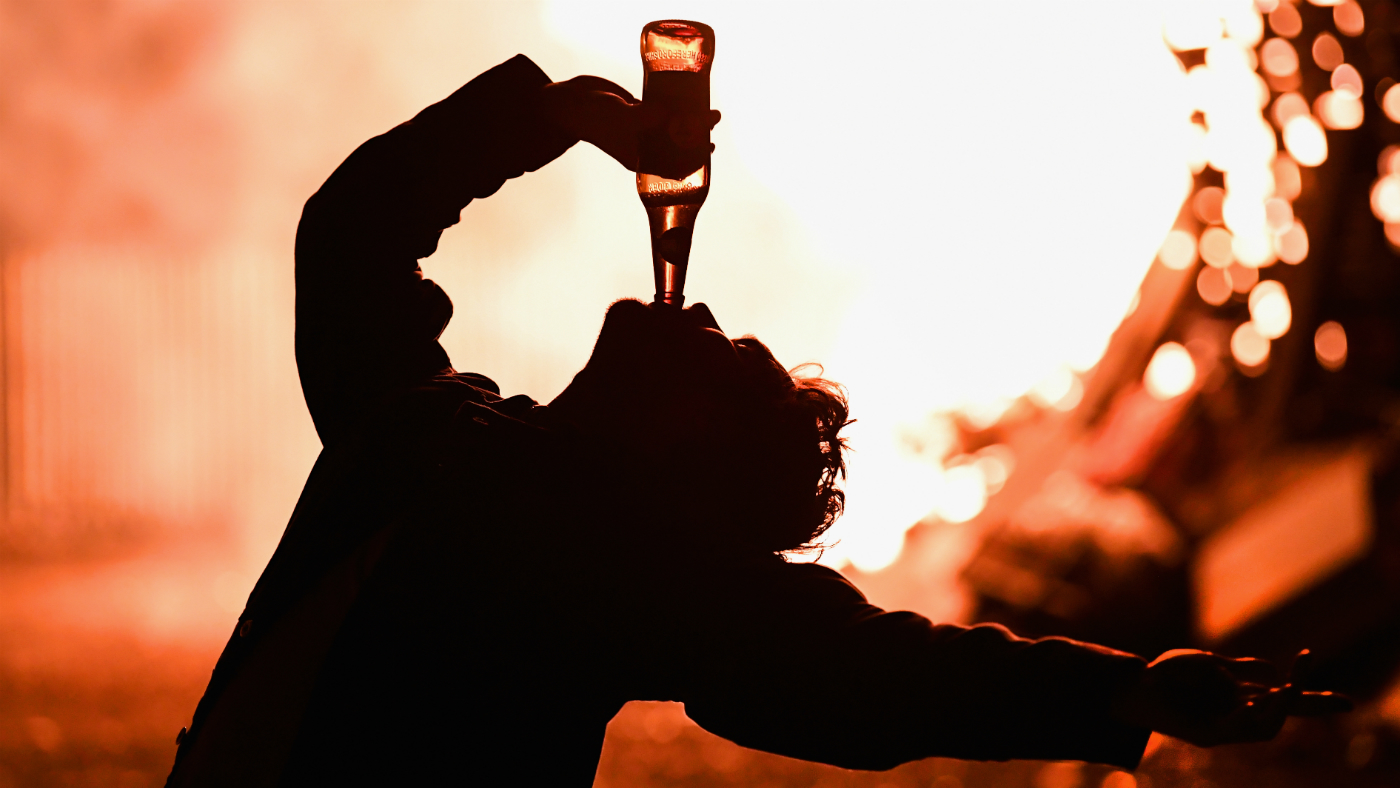Why a bonfire is sparking riots in Belfast
Police officers injured in clashes over anti-internment anniversary blaze

A free daily email with the biggest news stories of the day – and the best features from TheWeek.com
You are now subscribed
Your newsletter sign-up was successful
Three police officers have been injured in violent clashes at the site of an anti-internment bonfire in Belfast.
Trouble erupted in the city’s New Lodge estate on Thursday after a major bonfire was set up to mark the 48th anniversary of the introduction of internment without trial for people suspected of being involved in paramilitary groups during the Troubles, reports The Irish News.
More than 150 officers from the Police Service of Northern Ireland (PSNI) deployed to the scene were forced to withdraw after missiles were thrown at them as “youths protected pallets stacked up in a large pile”, says The Guardian.
The Week
Escape your echo chamber. Get the facts behind the news, plus analysis from multiple perspectives.

Sign up for The Week's Free Newsletters
From our morning news briefing to a weekly Good News Newsletter, get the best of The Week delivered directly to your inbox.
From our morning news briefing to a weekly Good News Newsletter, get the best of The Week delivered directly to your inbox.
PSNI Assistant Chief Constable Alan Todd later said the officers left the site of the bonfire because of the “risks to innocent by-standers” posed by their presence, adds the BBC.
Residents in nearby tower blocks were also advised to leave their homes as the Housing Executive authority warned it could not “guarantee their safety” due to the proximity of the bonfire.
The blaze went ahead as planned despite criticism of the “unwanted” event by politicians from both Sinn Fein and the Social Democratic and Labour Party (SDLP).
Sinn Fein’s Gerry Kelly said that “the vast majority of the community have told [Sinn Fein] they do not want this bonfire”, which had been built “by anti-social elements who torture this district throughout the year”.
A free daily email with the biggest news stories of the day – and the best features from TheWeek.com
What is the significance of bonfires in Northern Ireland?
Bonfires are used across Northern Ireland to mark political events or anniversaries, and are frequently a highly provocative gesture by both loyalists (those who support NI remaining in the UK, mostly Protestant) and republicans (who want NI to become part of the Republic of Ireland, mostly Catholic).
The most significant of these bonfires are those lit each year in loyalist areas on so-called Eleventh Night - the eve of 12 July - to celebrate Protestant William of Orange’s victory over the Catholic King James II at the Battle of the Boyne in 1690.
Supporters insist the bonfires are an important part of their culture, but critics claim they pose health and safety dangers and ignite sectarian strife.
This latter criticism mainly focuses on the use of provacative signs and effegies by rival sides, including slogans such as “KAT” - “kill all Taigs”, a slur used against Catholics.
A republican bonfire held in a different part of Belfast this week featured signs mocking 18 British soldiers who died in an IRA bomb attack in 1979, triggering widespread condemnation, reports the BBC.
Why are the anti-internment bonfires particularly controversial?
Each year on the night of 8 August, bonfires are lit in some republican-leaning areas of Belfast to pay tribute to republicans interned without trial during the Troubles, a measure introduced by the British government on 9 August 1971.
At total of 342 people were detained on the first day alone of what was termed Operation Demetrius.
Internment without trial was introduced under the 1922 Special Powers Act, and was deemed to be the only way to restore order as conflicts raged across Northern Ireland. However, the operation backfired spectacularly, as The Irish News notes.
Sir Kenneth Bloomfield, a Stormont civil servant at the time, told a subsequent BBC documentary “it soon became clear that far from quelling the uprising, the policy hugely increased recruitment into the IRA”.
-
 6 of the world’s most accessible destinations
6 of the world’s most accessible destinationsThe Week Recommends Experience all of Berlin, Singapore and Sydney
-
 How the FCC’s ‘equal time’ rule works
How the FCC’s ‘equal time’ rule worksIn the Spotlight The law is at the heart of the Colbert-CBS conflict
-
 What is the endgame in the DHS shutdown?
What is the endgame in the DHS shutdown?Today’s Big Question Democrats want to rein in ICE’s immigration crackdown
